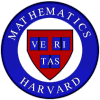
Tutorial Topics, (2000-2001)
| This is an archived page. The currently offered tutorials are here |
Fall '00
|
Spring '01
|
|
Dates to remember:
Tuesday, September 19, 5:30 pm - The first meeting of the Math Club at Mather House in Dining Rooms A&B. Hal Schenck and Russell Mann will speak about the Fall tutorials.
Wednesday, September 20, 4:30 pm - Organizational meeting for the Fall tutorials, Rm. 530
1. Computational Algebraic Geometry (Fall'00)
The interplay between algebra and geometry is a beautiful (and fun!) area of mathematical investigation. Advances in computing and algorithms over the last quarter century have revolutionized the area, making many formerly inaccessible problems tractable, and providing a fertile ground for experimentation and conjecture. We'll begin by studying the Grobner basis algorithm, which extends Gaussian elimination to systems of polynomial equations. Then we'll cover some basic commutative algebra and connections to geometry; i.e. rings and ideals, varieties, the Hilbert basis theorem, elimination and resultants, the nullstellensatz and primary decomposition.
The real objective of the course is to bring whatever we choose to study to life by doing lots of examples. There are many paths we can take; a homological direction (free resolutions, Tor and Ext, Hilbert syzygy theorem), a combinatorial direction (Stanley-Reisner rings, upper bound theorem, applications to polytopes and discrete geometry); or an applied direction (coding theory, integer programming, mathematical modeling, and robot control). Or we can take a tapas approach, and study some of everything.
The subject of Fourier Series is an essential and extremely useful branch of mathematics. Although it can be as technical as one requires, it does not have to be, and there are many beautiful and intriguing applications of Fourier Series throughout mathematics and in many other subjects as well. For example, during the semester we will examine applications to number theory, PDE's and Fourier Analysis on groups. We won't assume a great deal of background beyond knowledge of basic calculus results, and so we'll begin the semester by studying the basics of Lebesgue measure, integration, and Hilbert spaces. We'll then start studying Fourier series in a number of contexts, examining Gibbs' phenomenon, for instance. Later on we'll work with Fourier transforms, Schwartz spaces and the Poisson summation formula.
2000-08-06 |